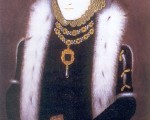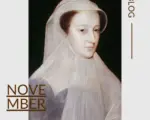
YOUR SEARCH UNCOVERED 381 RESULTS
-
Blog: fascinating discoveries and intriguing collections

-
11 October – Henry VIII and Anne Boleyn set sail for Calais

On this day in Tudor history, 11th October 1532, King Henry VIII and Anne Boleyn, the newly created Marquess of Pembroke, set sail from Dover aboard the king’s ship, The Swallow.
They were off to Calais on a mission involving the Great Matter, Henry VIII’s quest for an annulment. But why? What would they do there? Who would they meet?
Find out more about this trip, what happened and what happened next, in today’s talk.
[Read More...] -
31 August – The Bloody Flux
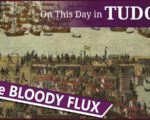
On this day in Tudor history, 31st August 1545, a contagious disease known as the ‘Bloody flux’ hit the port of Portsmouth, killing many of the men serving on the ships in its port.
But what was the Bloody Flux? What were its symptoms and why did it kill so many soldiers and sailors?
Find out about the disease, famous victims of the Bloody Flux, and how it is still affecting people today, in this talk:
[Read More...] -
10 August – Drownings at London Bridge
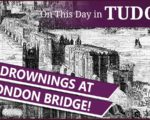
On this day in Tudor history, 10th August 1553, the same day that Queen Mary I held requiem mass for the soul of her late half-brother, Edward VI, seven men died at London Bridge. They were drowned.
Find out more about what happened to these men – one of whom was Thomas Brydges, the son of Sir Thomas Brydges, Deputy Lieutenant of the Tower of London – how the Thames was the preferred way of travelling around London, and how and why it could be dangerous around London Bridge, in today’s talk.
[Read More...] -
16 April – A fortune from drinkable gold
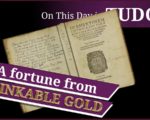
On this day in Tudor history, 16th April 1550, alchemist, apothecary and physician Francis Anthony was born, probably in London. He had a rather eventful life, being imprisoned on several occasions, and he made his fortune from his invention aurum potabile, drinkable gold, which he claimed had amazing curative powers.
Find out more about Francis Anthony and why he ended up in prison in today’s talk.
[Read More...] -
April 2020 – Tudor Life – The Lancasters
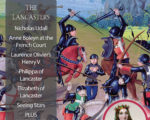
Here’s the full version of your monthly magazine: all about the house of Lancaster. The magazine is a whopping 80 pages long and it’s chock full of top articles as normal.
[Read More...] -
March 2020 – Tudor Life – Music and Drama

-
February 2020 – Tudor Life – Rebellion

Here’s the full version of your monthly magazine: all about Rebellion and how a number of critical moments could have changed Tudor history forever.
[Read More...] -
November 2019 – Tudor Life – Tudor Scandals

-
11 October – A procession and prayers for Queen Jane Seymour

On this day in Tudor history, 11th October 1537, poor Jane Seymour was in labour with her first and only child, Edward VI.
It was a long and difficult labour, and on 11th October, there was a solemn procession in the city of London to pray for her. After about thirty hours, Jane gave birth to a healthy baby boy, who would become King Edward VI.
In today’s talk, I share contemporary sources about the procession and Jane’s labour.
[Read More...] -
Tudor History Challenge 4

Hello, Claire here! I’m celebrating reaching 25,000 YouTube subscribers today by having a bit of fun at Tim’s expense, although I am allowing Henry VIII and William Shakespeare to help him a bit.
Play along with us and see whether you can do better than Tim with these Tudor history questions (surely you can!). Get 1 point for each correct answer and question 16 is worth a possible 3 points. The questions are below, and then the answers below that, so please don’t look ahead! Good luck!
I would just like to say a big thank you for following this channel. I feel so blessed to be able to talk Tudor with you.
[Read More...] -
16 April – Guy Fawkes was baptised
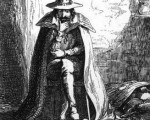
On this day in Tudor history, 16th April 1570, Gunpowder Plot conspirator Guy Fawkes was baptised in York.
In today’s video, I talk about how the Gunpowder Plot has its origins in the reign of Queen Elizabeth I and why these men were driven to try and blow up Westminster.
[Read More...] -
Sir Henry Norris (1490s-1536)
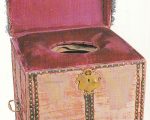
Sir Henry Norris was born sometime in the late 1490s and was the son of Richard Norris and grandson of Sir William Norris of Yattendon and his wife, Jane de Vere, daughter of John de Vere, 12th Earl of Oxford. Norris’s family had a long history of serving the monarch – his great-grandfather, Sir John Norris, had been Keeper of the Great Wardrobe to Henry VI and his grandfather, Sir William Norris, had been Knight of the Body to Edward IV. Sir William Norris had been attainted after being involved in the Duke of Buckingham’s rebellion against Richard III and had been forced to flee to Brittany, where he joined the forces of Henry Tudor and may even have fought at the Battle of Bosworth. Sir William had a command in June 1487 at Stoke and went on to become the Lieutenant of Windsor Castle.
[Read More...] -
This week in history 8 – 14 October
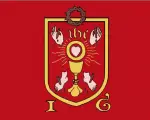
8th October:
1515 – Birth of Lady Margaret Douglas, Countess of Lennox. Margaret was the daughter of Margaret Tudor, Queen Dowager of Scotland and sister of Henry VIII, and Archibald Douglas, 6th Earl of Angus.
[Read More...]
1536 – The commons, i.e. the people, approved the petition of grievances drawn up by the rebels of Horncastle, Lincolnshire.
1549 – Edward Seymour, Duke of Somerset and Lord Protector, was proclaimed a traitor by the King’s Privy Council.
1561 – Baptism of Edward Wright, mathematician and cartographer, at Garveston in Norfolk. Wright is known for his treatise “Certaine Errors in Navigation” (1599), his work on Mercator’s map projection and his translation of John Napier’s 1614 Mirifici logarithmorum canonis descriptio into English.
1594 – Death of Ellis Price (Prys), scholar and administrator. Price served Henry VIII as a Monastic Visitor in Wales 1535, Commissary-General and Chancellor of the diocese of St Asaph, and as an administrator in Wales after the “Acts of Union”. He also later served as Sheriff of Merioneth, Anglesey, Caernarfon, and Denbigh, and a member of the council in the Marches of Wales. -
This week in history 16 – 22 July
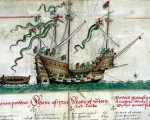
16th July:
1517 – Birth of Frances Grey (née Brandon), Duchess of Suffolk, at Hatfield. She was born on St Francis’s Day and was the eldest daughter of Charles Brandon, Duke of Suffolk, and Mary Tudor, widow of Louis XII and sister of Henry VIII. Click here to read all about her.
[Read More...]
1546 – Protestant martyrs Anne Askew, John Lascelles, John Adams and Nicholas Belenian were burned at the stake at Smithfield in London for heresy. Click here to read more about Anne.
1556 – Burnings of Julins Palmer, John Gwyn, and Thomas Robyns [some sources say Askew or Askin] in the old sandpits in Enborne Road, Newbury, after they were found guilty of sedition and heresy. They are known as the Newbury Martyrs.
1557 – Death of Anne of Cleves, fourth wife of Henry VIII, at Chelsea Old Manor after a few months of illness. On the same day, her body was embalmed and placed in a coffin covered with a cloth bearing her arms. Tapers were lit around her coffin and prayers said on a daily basis. She was buried in Westminster Abbey on 4th August.
1574 – Death of John Hart, scholar, phonetician and Chester Herald, in London.
1600 – Death of George Cranmer, scholar, administrator and nephew of Thomas Cranmer, the late Archbishop of Canterbury, in a skirmish with Irish rebels at Carlingford. He was in Ireland serving Charles Blount, Lord Mountjoy, as Secretary during a military campaign. -
This week in history 9 – 15 October

On this day in history…
9th October:
1514 – The eighteen-year-old Mary Tudor, sister of Henry VIII, married the fifty-two-year-old King Louis XII of France at Abbeville.
[Read More...]
1529 – A writ of praemunire was filed against Cardinal Thomas Wolsey in the court of King’s Bench.
1536 – Pilgrimage of Grace: The rebels of Horncastle, Lincoln, dispatched their petition of grievances to the King and also north into Yorkshire.
1547 – Baptism of Miguel de Cervantes, author of Don Quixote, in Alcalá de Henares, Spain. His actual birthdate is unknown.
1573 – Death of Sir Thomas Wroth, courtier, politician and landowner. Wroth served Edward VI as a Gentleman of the Privy Chamber and was with him when he died.
1604 – Death of Sir William Peryam, Judge, at Little Fulford, near Credington in Devon. He was laid to rest at Holy Cross Church. Peryam was on the commissions at the trials of Mary, Queen of Scots, the Earl of Arundel, the Earl of Essex and Sir John Perrot, and served as Chief Baron of the Exchequer from 1593 until his death. -
Forthcoming Tudor Events

Step back in time to the dramatic year of 1547, when the mighty armies of Scotland and England gave battle to determine who should marry the infant Queen of Scots. With fascinating living history encampments, hands-on activities for all the family, and spectacular battle recreations, this wonderful historical event is not to be missed. See the drama and excitement of Battle of Pinkie Cleugh come to life before your eyes, and discover more about this fascinating period of our history.
[Read More...] -
This week in history 17 – 23 July
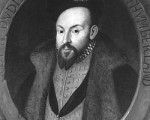
On this day in history…
17th July:1497 – Death of Sir James Ormond (Butler), administrator and illegitimate son of John Butler, 6th Earl of Ormond, in a duel with Sir Piers Butler, near Kilkenny. The Butlers of Ormond were related to Thomas Boleyn, Queen Anne Boleyn’s father.
[Read More...]
1537 – Burning of Janet Douglas, Lady Glamis, on the castle hill at Edinburgh after being found guilty of two counts of treason. She had been charged with plotting the King’s death (by poison) and assisting and corresponding with her brothers, Sir George Douglas and Archibald Douglas, 6th Earl of Angus.
1555 – Protestant martyrs Christopher Wade (Waid) of Dartford, linen-weaver, and Margaret Polley of Tunbridge, were burned for heresy. Click here to read more.
1555 – Birth of Richard Carew, antiquary, bee-keeper, translator and poet, at Antony House, Torpoint, Cornwall. Carew was the eldest son of Thomas Carew and his wife Elizabeth (née Edgcumbe). Carew was a member of the Elizabethan Society of Antiquaries, and his works included his “Survey of Cornwall”, a county history.
1565 – Death of Sir Thomas Dacre of Lanercost, illegitimate son of Thomas Dacre, 2nd Baron Dacre. He died while holding the office of Sheriff of Cumberland.
1601 – Death of Richard Latewar, poet, theologian, Vice-President of St John’s College, Oxford, and chaplain to Charles Blount, 8th Baron Mountjoy. He died from a gunshot wound sustained in a skirmish at Bennurb, in Ireland, while on a campaign there with Mountjoy. Latewar was buried at Armagh Cathedral, and a monument was erected to him in the chapel of St John’s in Oxford. -
A Tudor gem that made me dance by Janet Wertman

-
This week in history 10 – 16 April
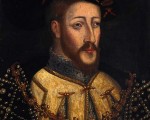
On this day, 10th April…
1512 – James V, King of Scotland, was born at Linlithgow Palace. He was the fourth child of James IV and Margaret Tudor, sister of Henry VIII. He was the only one of James and Margaret’s children to survive childhood, and so inherited the crown of Scotland when his father was killed at the Battle of Flodden, 9th September 1513.
[Read More...]
1550 – Edward Seymour, Duke of Somerset, was re-admitted into Edward VI’s council.
1559 – Death of Sir Rice Mansel, soldier and administrator, at his home in Clerkenwell. He served Henry VIII as Vice-Admiral in 1542, in France and Scotland, and in 1544 as Knight-Marshal. He was also Chamberlain of Chester.
1585 – Death of Pope Gregory XIII, the Pope known for his introduction of the Gregorian Calendar, in Rome. He was succeeded by Pope Sixtus V. -
This week in history 10 – 16 October
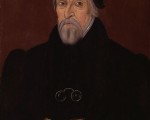
On this day in history events for week beginning 10th October…
10th October:
[Read More...]
1505 (10th or 11th) – Death of William Barons (Barnes), Bishop of London and former Master of the Rolls. He was buried at St Paul’s Cathedral.
1530 – Death of Thomas Grey, 2nd Marquis of Dorset, magnate, soldier and courtier. He was buried at Astley Collegiate Church in Warwickshire. Grey’s offices included Constable of Warwick Castle and of Kenilworth Castle, and he also acted as Chief Answerer at the marriage of Prince Arthur and Catherine of Aragon. Grey was also the grandfather of Lady Jane Grey.
1549 – Edward Seymour, Duke of Somerset and Lord Protector, was ordered to leave Windsor Castle and to give himself up. He had moved there with the young Edward VI on the 6th October, from Hampton Court Palace, after learning that his protectorship was in danger. -
Fliers for MadeGlobal’s “An Evening with the Authors” 24 Sept

Many of the Tudor Society members will be at MadeGlobal’s “An Evening with the Authors” event on 24 September in central London, and it would be so lovely to see you there.
[Read More...] -
10 August 1512 – The Battle of Saint-Mathieu
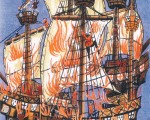
On the 10th August 1512, the Battle of Saint-Mathieu, a battle in the War of the League of Cambrai, took place between the English and Franco-Breton fleets off the coast of Brest. England at this time was allied with Spain and the Holy Roman Empire against France.
[Read More...] -
The Tudors’ Journey to Bosworth: Part 1 by Tony Riches
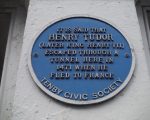
Henry Tudor’s return from exile to victory at Bosworth has to be one of the greatest moments in the history of the Tudor dynasty. So why is the Bosworth story so often told from the perspective of Richard III, with Henry depicted as lucky to have won?
I was born within sight of Pembroke Castle and have always been intrigued by the small room where the thirteen-year-old Lady Margaret Beaufort gave birth to the future king, Henry Tudor. I’ve also stood on the remote beach at Mill Bay near Milford Haven imagining how Henry would have felt as he approached with his uncle Jasper and his mercenary army.
All I knew about Jasper’s father, Henry’s grandfather, Owen Tudor, was that he’d been a Welsh servant who somehow married the young widow of King Henry V, Queen Catherine of Valois. Inspired to write a historical fiction trilogy about them, I wanted to research their stories in as much detail as possible and to sort out the many myths from the facts.
[Read More...] -
This week in history 18 – 24 July
-
July 2016 Tudor Life Magazine

Interested in the life and reign of Edward VI, the boy king? This magazine is just for you. Also has an exclusive article about artist Levina Teerlinc.
[Read More...] -
An evening with the authors – 24 September 2016, London

Yay! I’m so excited! On 24th September eighteen of MadeGlobal Publishing’s authors will be in London for “an evening with the authors”. This is your chance to mingle with 18 Tudor history authors (many of whom are Tudor Society contributors), have your photo taken with them by a professional photographer, get their autographs, discuss your book idea with MadeGlobal Publishing, and fire questions at the authors in a Q&A session.
[Read More...] -
This week in history 11 – 17 April
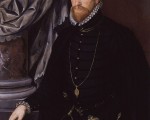
-
The Battle of Agincourt by Heather Darsie
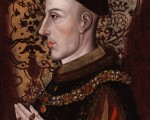
As you may have read in this month’s Tudor Life magazine, 25th October marked the feast day of Saints Crispin and Crispinian, and following the victory of England over France on 25 October 1415 at the Battle of Agincourt, the day became a celebration of that event too. Celebrations included bonfires, revelry and the crowning of a King Crispin.
Today, Heather Darsie shares an article with us on the Battle of Agincourt back in 1415.
[Read More...] -
This week in history 5 – 11 October


